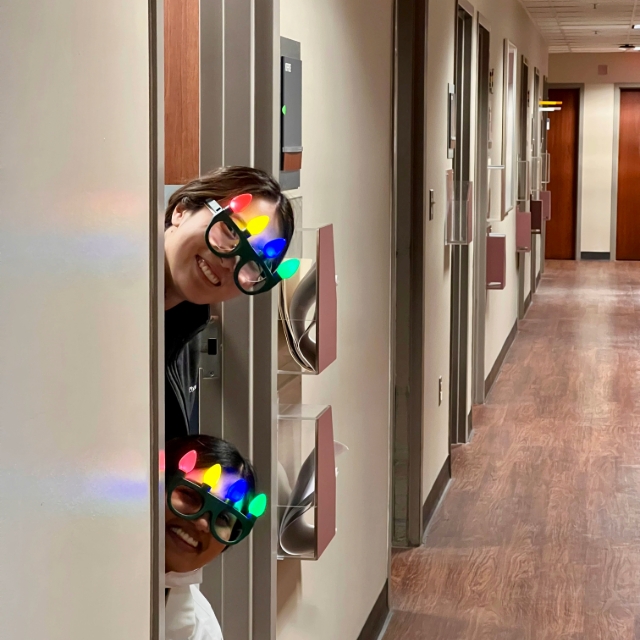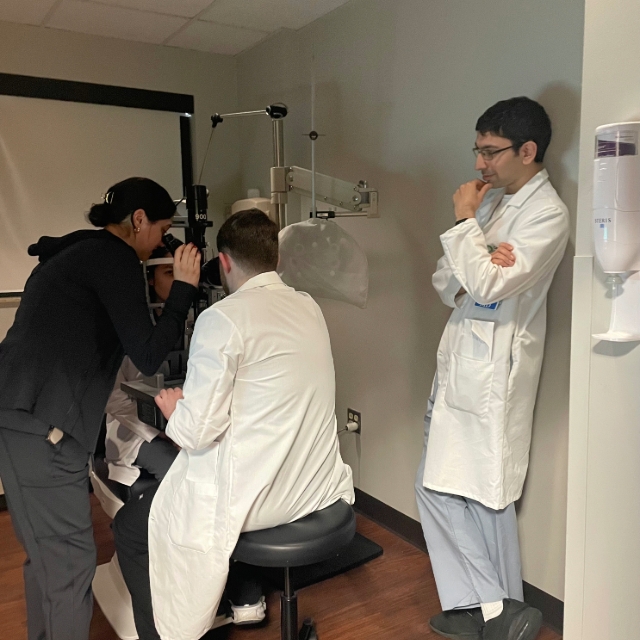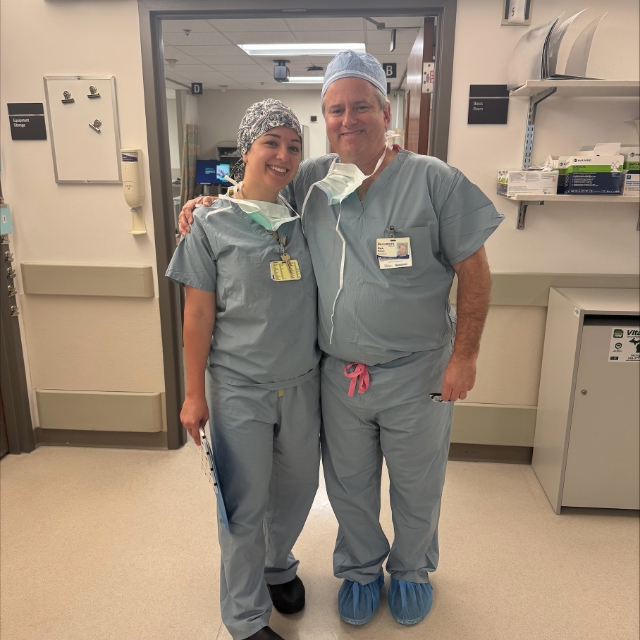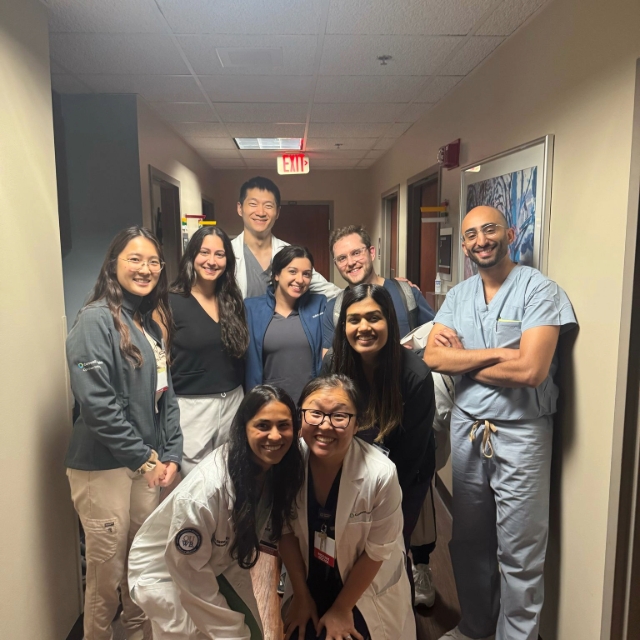Curriculum
Clinical teaching
- The Corewell Health William Beaumont University Hospital Eye Institute is the primary residency site for clinical teaching and patient interaction
- Residents see patients in the eye clinic under the supervision of the clinic director
- The clinic uses a continuity of care model in which residents are responsible for the care of assigned patients throughout their three year tenure
- Patients are initially evaluated by a resident physician in the general ophthalmology clinic
- Should a patient require ophthalmic subspecialty evaluation and management, the same resident may present the patient to the appropriate sub-specialist and continue to actively manage the patient's medical or surgical care
- Hospital and emergency center consultations provide a major source of clinical teaching throughout the residency
- Rotations through each of the ophthalmic sub-specialties are an integral part of the resident experience
Surgical teaching
- Operating room experience is acquired during each year of training with advancing resident surgical participation
- Microsurgical techniques are introduced during the transitional year internship and then advanced through the first year of residency as part of the anterior segment/cataract surgical rotation
- Residents are assigned to a core group of anterior segment attending surgeons with over 10 years of post-training surgical experience
- Second year residents rotate on ophthalmic surgical subspecialty services for two-month blocks during which they receive graded responsibility and are involved in progressively varied and complex surgical procedures.
- Third year residents have a individual rotation experience in Femtosecond-Laser-Assisted cataract surgery
- Surgical rotations can be tailored in the third year of residency to allow residents opportunity for additional exposure in their individual areas of interest
By the conclusion of the residency, the resident should expect to have participated in
- 300- 350 cataract surgeries with approximately 150 as primary surgeon
- 60 - 80 corneal surgeries
- 250 - 300 ophthalmic plastic surgical procedures
- 40 - 60 pediatric strabismus procedures
- 40 - 50 retinal procedures
- 25 - 40 glaucoma procedures
- 50 - 60 anterior segment laser procedures
- 60 - 70 retinal laser procedures
- 200 - 250 intravitreal injections
- 15 - 25 traumatic open globe surgical repairs
Transitional year
Internship is an opportunity to apply the knowledge and skills learned during medical school and expand our ability to treat patients in need. A robust internship is necessary for every physician to become comfortable delivering care in various settings including outpatient, medicine floors, pediatric populations, critical care patients, and those presenting to the emergency department. Completing the internship at Corewell Health William Beaumont University Hospital also helps us build camaraderie with the residents and staff that will be consulting us during our time as ophthalmology residents. Our transitional year is a joint program administered by emergency medicine, family medicine and internal medicine. Rotations include the following:
- At least 24 weeks of fundamental clinical skills rotations (emergency medicine, family medicine, general surgery, internal medicine, obstetrics & gynecology, pediatrics, or primary critical care)
- At least 8 weeks of rotations involving care of inpatients in general medicine, general pediatrics, general surgery, obstetrics & gynecology, or family medicine
- At least 4 weeks in emergency medicine
- At least 140 hours of documented experience in ambulatory care in family medicine, primary care internal medicine, general surgery, obstetrics & gynecology, or pediatrics
- At least 8 weeks of electives
The last 3 months of the TY year are reserved for the newer ACGME requirement of 3 months of ophthalmology in the TY curriculum. This schedule has allowed for a smooth transition into the PGY-2 curriculum of the ophthalmology residency
For more information, transitional year - Royal Oak
First year
This year is dedicated to establishing a broad foundation of ophthalmic knowledge, physical exam skills, and the ability to synthesize information to deliver patient care. These skills will ultimately allow the first-year resident to identify the likely site of pathology for any ophthalmological chief complaint. First-year residents also attend the Illinois Eye Review course held at University of Illinois Chicago.
General ophthalmology - 4 months
- Clinical experience: The general ophthalmology rotation is geared toward dedicating time to learning the components of the comprehensive ophthalmic exam. This includes developing the skills of retinoscopy, refraction, manual keratometry, gonioscopy, slit lamp biomicroscopy of anterior and posterior segment structures, as well as direct and indirect ophthalmoscopy of the fundus
- Surgical experience: Dedicated block time is set during this rotation to expose junior residents to anterior segment surgery. Working with Dr. Mark Rolain and Dr. Gupta, residents start as assistants to cataract and anterior segment surgery and transition to primary surgeon
Consults - 4 months
- Dedicated in-patient and emergency department ophthalmology consult service: The consult rotation dedicates time for residents to focus on urgent and emergent in-patient and emergency room consults for William Corewell Health Hospital in Royal Oak, an 1100 bed major academic and tertiary referral center with a 150 bed Level-1 adult trauma and Level-2 pediatric trauma emergency department. During this time, the resident is free from clinic duties to focus on our busy in-patient service, which receives well over 2000 consults a year. The consult resident assists and performs urgent procedures and surgeries boarded during business hours
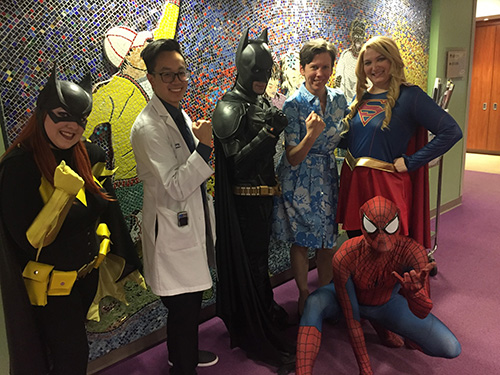
Consult rounds on the peds floor with superheroes.
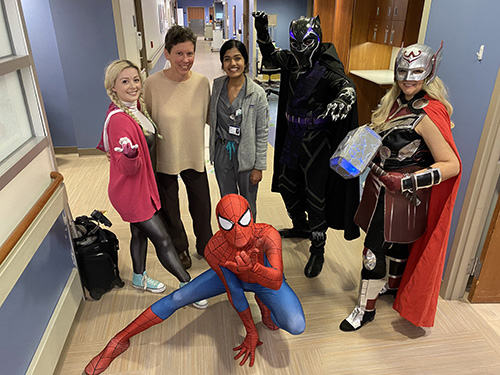
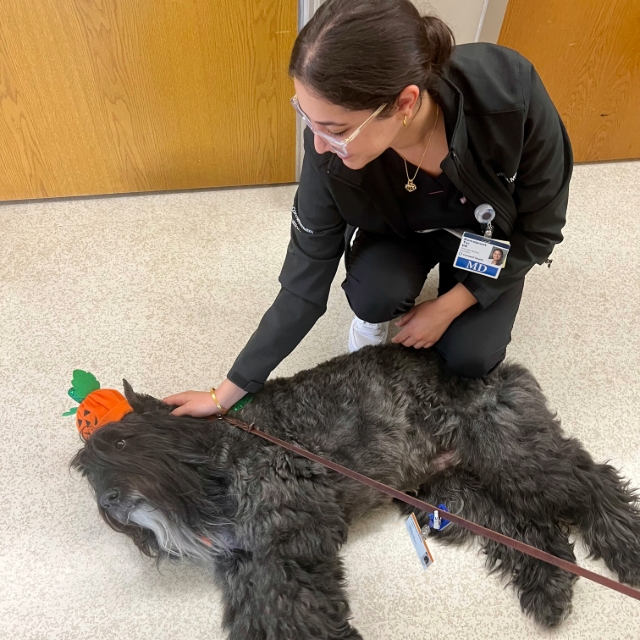
Taking a break from consults.
Emergency clinic - 4 months
- Dedicated outpatient emergency clinical experience: The emergency clinic rotation allows junior residents the opportunity to evaluate and manage problem focused ophthalmic complaints while utilizing ophthalmic diagnostic testing and imaging tools. Our clinic has a dedicated procedure room with an operating microscope to perform urgent and emergent procedures
Fall and spring microsurgical course
- Under the direction of Dr. Mark Rolain, the skills necessary for ophthalmic surgery are developed in a wet laboratory model to supplement the experience residents receive in the field. This includes suturing
Second year
The second year is dedicated to honing residents’ physical exam, diagnostic, management, and surgical skills in each subspecialty in ophthalmology. Each rotation consists of a two month block. Our program grants residents experience in both academic and private practice environments. Experiences in these ophthalmic subspecialties will include rotations through subspecialty practices and operating room exposure. Surgical experience includes routine, as well as, complex procedures as determined by the supervising attending surgeon. Second year residents participate in all academic conferences, and attend the annual meeting of the American Academy of Ophthalmology. Rotations and their respective locations are as follows:
- Neuro-ophthalmology and anterior segment - Corewell Health Eye Institute, Royal Oak, MI
- Orbit and eye plastics - Consultants in Ophthalmic & Facial Plastic Surgery, Southfield, MI
- Medical retina and vitreoretinal surgery - Associated Retinal Consultants, Royal Oak, MI
- Cornea and external disease - Corewell Health Eye Institute, Royal Oak, MI
- Glaucoma - Michigan Glaucoma Specialists, Royal Oak, MI and Glaucoma Center of Michigan, Southfield, MI
- Pediatric ophthalmology - Children’s Hospital of Michigan, Detroit, MI
Third year
Senior ophthalmology residents supervise junior residents, manage complex medical eye diseases, perfect the necessary surgical skills to perform routine anterior segment procedures, and acquire surgical skills to perform complex subspecialty surgical cases. This year provides an intensive surgical experience intended to prepare all residents for comprehensive ophthalmology practice or subspeciality fellowships of their choosing. Senior residents serve their own patients with graduated autonomy in their dedicated general ophthalmology clinic. Further board preparation is provided through sponsoring residents to attend the Wills Eye Review. Senior residents’ schedules consist of the following:
- Resident comprehensive practice
- Resident-run subspecialty clinic
- Dedicated cataract surgical block time
Didactics
The teaching faculty dedicate time to provide a robust didactic lecture program. Numerous members of our teaching staff are invited to lecture at national meetings and board review courses. Topics covered throughout our training include the following.
Lecture
- Contact Lens / Vision Rehabilitation & Low Vision (Dr. Nielson and Dr. Wong)
- Cornea (Dr. Gupta, Dr. Heidemann, Dr. Dunn)
- Fundamentals of Ophthalmology (Dr. Rolain)
- General Medicine (Dr. Dilorenzo)
- Glaucoma (Dr. Siegel and Dr. Obertynski)
- Lens and Cataract (Dr. Page)
- Neuro-Ophthalmology (Dr. Nagia)
- Ocular Manifestations of Systemic Disease (Dr. Stec)
- Oculoplastics (Dr. Kahana & oculoplastics fellows)
- Ophthalmic Pathology (Dr. Folberg)
- Pediatric Ophthalmology and Strabismus (Dr. Rao)
- Retina and Uveitis (Dr. Faia, Dr. Jancevski, and the Vitreoretinal Surgery Fellows)
Grand Rounds
The Corewell Health Eye Institute hosts monthly Grand Rounds conferences consisting of basic science lectures, visiting professors lectures to the residents, resident case presentations, and keynote guest lecture presentations
Anterior segment conference
Monthly video conferences allow residents to discuss their surgical cases with their colleagues and attending physicians and retrospectively evaluate techniques, pearls, and areas of improvement. At Corewell Health, we have the ability to record our surgical cases in high definition which allows us to review our surgical skills and focus on fine details in order to prevent complications and improve management of difficult cases
Fluorescein angiography / imaging conference
Weekly imaging conference is held with leadership from our esteemed Vitreoretinal Surgery fellows. By discussing interesting cases generated from our resident-run retina clinic, we develop our skills of clinically evaluating the posterior segment, in addition to correlating findings with optical coherence tomography, fundus autofluorescence, and fluorescein angiography
Call
- First and second years take call every 6th day including weekends. First years cover major and minor holiday call. Each first year gets one major and one minor holiday weekend off. Second years do not take holiday call
- Third years take back-up call throughout the year. Each third year covers back-up call for one major and one minor holiday.
- ED Eye Room: A fully equipped examination and procedure room located in the heart of the Corewell Health William Beaumont University Royal Oak Emergency Department for use on call. Includes a slit lamp, indirect ophthalmoscope, direct ophthalmoscope, muscle light, set of prisms, Hertel exophthalmometer, lock-protected drawer of diagnostic and therapeutic medications, and cabinets fully stocked with instruments and supplies
Contact us
Natalia Holznagle
Program manager
Phone: 248.551.1554
Email: natalia.sporysz@corewellhealth.org



